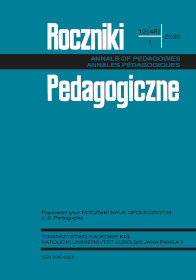Wychowanie społeczne w ujęciu Jacka Woronieckiego. Uwagi wstępne
Social Education in the Jacek Woroniecki’s Point of View
Author(s): Ryszard PolakSubject(s): Social Sciences, Education, History of Education
Published by: Towarzystwo Naukowe KUL & Katolicki Uniwersytet Lubelski Jana Pawła II
Keywords: social education; individualism; collectivism; justice; family; Catholic Church; school; teacher; school programs
Summary/Abstract: Social education’s issues were Jacek Woroniecki’s particular interest. He was a scholar and practitioner, who, as a teacher and pastor, exerted influence on the formation of characters and attitudes of children and young people. The Polish Dominican also devoted a lot of space to this issue in his works.Woroniecki was opposed to individualism and collectivism—doctrines that, in his opinion, overly interpreted human nature. The first of these—individualism—downplayed the social upbringing of people, recognizing that man as an egoist by nature will never be able to accept the moral norms and principles imposed on him by society. So, individualists believed that a man should first of all be the master of his lif—not looking at society and the rules of conduct binding in it. The second of these doctrines—collectivism—assumed that imposing norms of behavior on individuals in large social groups (e.g. nation or state) would certainly contribute to maintaining social order, even against the good of individual people.The Polish Dominican believed that the fight against individualism and collectivism must consist in educating man for moral virtues, both individual and social. Thanks to them, man can function properly in society and develop his natural predispositions and inclinations, as well as live well and function as a fully free and autonomous person in his actions.Woroniecki devoted a lot of space in his works to the virtue of justice, which by many of his modern thinkers was falsely conceived. This was the source of many social conflicts and misunderstandings. He also believed that one should return to the ancient and medieval (mainly scholastic and based on the St. Thomas Aquinas’works) concept of justice as a moral virtue, consisting in giving every man what was rightly due to him. Everyone should be brought up in this attitude; it is not possible to reduce fair proceedings only to observing the law established by the state. Every human being should, spontaneously and without any external coercion, take care of his own good and that of other people, doing it naturally, since childhood.According to Woroniecki, people should be brought up to social life in the natural communities they need to function well: the family, the Catholic Church, and school, which due to the rapid development of science and education plays an increasingly important role in the modern world. In Woroniecki’s opinion, the family should have a monogamous and lasting character, and its development and educational tasks should be supported by the state and its binding law. Also, the Catholic Church, which is an institution that enables the spiritual development of man, gives its community members the opportunity to cooperate and work together, and thus to grow up. It also teaches less and less often, but a valuable and dignified cultivation of the virtue of humility, as well as regularity and perseverance in the pursuit of good.The school educates man thanks to teachers and educators who should be morally good and educated people, and who know well the child’s psyche and the law of his moral, intellectual and physical development. Woroniecki attached great importance to the need for skilful education of students based on well-prepared school programs and properly selected reading material. Youth organizations, mainly scouts, also play an important role in social education.
Journal: Roczniki Pedagogiczne
- Issue Year: 12/2020
- Issue No: 1
- Page Range: 119-131
- Page Count: 13
- Language: Polish

